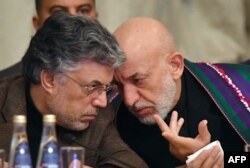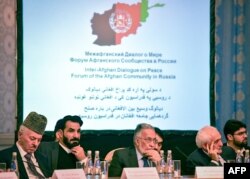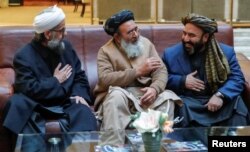The Taliban is reported to have killed up to 40 government troops in separate attacks in northern Afghanistan as a controversial "intra-Afghan dialogue” began Tuesday in Moscow to debate a political resolution to the war.
The deadliest of the insurgent raids occurred early Tuesday near the provincial capital of Kunduz, officials and residents said.
Safiullah Amiri, the deputy chairman of the provincial council, told Afghan media the attack killed at least 25 soldiers and three policemen while 20 others were wounded. The clashes lasted two hours, he added.
Defense Ministry officials in Kabul have confirmed the early morning “large scale” attack by the Taliban, saying it was swiftly repulsed, killing 22 assailants and injuring many more. They admitted Afghan forces suffered casualties but would not reveal any figures.
Taliban spokesman Zabihullah Mujahid claimed its attack in Kunduz killed 30 personnel of the Afghan National Army.
The insurgents also raided a police post overnight in neighboring Baghlan province, killing at least 10 security troops, Afghan media quoted unnamed security officials as confirming.
Afghan authorities rarely make public their battlefield casualties. But President Ashraf Ghani recently revealed last month that more than 45,000 government forces have been killed since he took power in September 2014.
Moscow talks
The clashes came as Taliban and Afghan opposition leaders gathered in Moscow for what organizers said would be a two-day “intra-Afghan peace meeting” to discuss recent peace building efforts in Afghanistan.
Afghan Foreign Ministry Spokesman Sebghatullah Ahmadi told VOA the Moscow meeting has no legitimacy and the government will not accept any possible outcome of the discussions.
A 10-member Taliban delegation, led by chief insurgent negotiator Sher Muhammad Abbas Stanikzai, and about 40 prominent Afghan figures, accompanied by former president Hamid Karzai, are participating in the discussions, but no representatives of President Ashraf Ghani have been invited.
In a departure statement Monday, the Afghan opposition delegation noted the Moscow meeting was “the first step towards intra-Afghan peace talks.”
Ghani’s government has criticized the gathering as “little more than a political drama” and an attempt by “so-called founders” of the current Afghan democracy “to gain power.”
The Taliban remains averse to any direct or indirect talks with the Kabul government, dismissing it as an American “puppet.”
The so-called “intra-Afghan peace meeting” in Russia comes days after the United States reported “significant” progress in ongoing talks with Taliban insurgents, though they also excluded the Afghan government.
Denying involvement
The Russian government has denied involvement in arranging the disputed huddle in Moscow, which was held at the Kremlin-owned President Hotel.
Between the choice of the high-security venue itself and the sheer number of visas issued to participants, it appeared the Afghan diaspora group that organized the talks was at least working in coordination with government officials.
The scene around the hotel on Tuesday was one of high security. Anyone without formal registration to enter the hotel was not allowed on the premises, and black sedans with Russian license plates and single roof-mounted flashing blue lights – the sign of Kremlin or State Duma officialdom on Russia’s roadways – were seen coming and going from the hotel entrance.
The New York Times reported that both Afghan representatives and Taliban members said Russian officials were playing a “major role behind the scenes.”
Russian state media mostly downplayed the event's significance, with TASS reporting only that the Kremlin "had no planned meetings with the Taliban." Domestic television coverage of the event was virtually non-existent.
The dialogue underscores a deepening political divide in Afghanistan and further weakens the Afghan government, analysts say.
Russia criticized
Afghan officials have criticized Moscow for not upholding its pledges to facilitate direct talks between Kabul and the Taliban.
Russian Foreign Minister Sergey Lavrov, apparently responding to the criticism, has reiterated his government’s committed to help in a political settlement to the Afghan conflict.
“Russia has been actively advocating an intra-Afghan dialogue involving both the government and the Taliban, which are part of Afghan society; there is no denying this,” Lavrov noted while speaking to reporters on Monday.
“It is common knowledge that a dialogue between the Afghan government and the Taliban cannot be avoided,” he added.
Lavrov, however, criticized Washington for holding what he described as “behind closed doors” talks with the Taliban.
The Russian foreign minister was directly referring to last months’ six-day negotiations U.S. reconciliation envoy Zalmay Khalilzad held with Taliban officials in Qatar.
Khalilzad and the Taliban say they made significant progress in the Doha talks and have come close to a deal on withdrawal of U.S.-led foreign forces from Afghanistan. In exchange, the Taliban has assured it will not allow international terrorist groups, including al-Qaida and Islamic State to plot attacks from Afghan soil.
U.S. and Taliban negotiators are due to meet again in Qatar on February 25 to resume their discussions.







